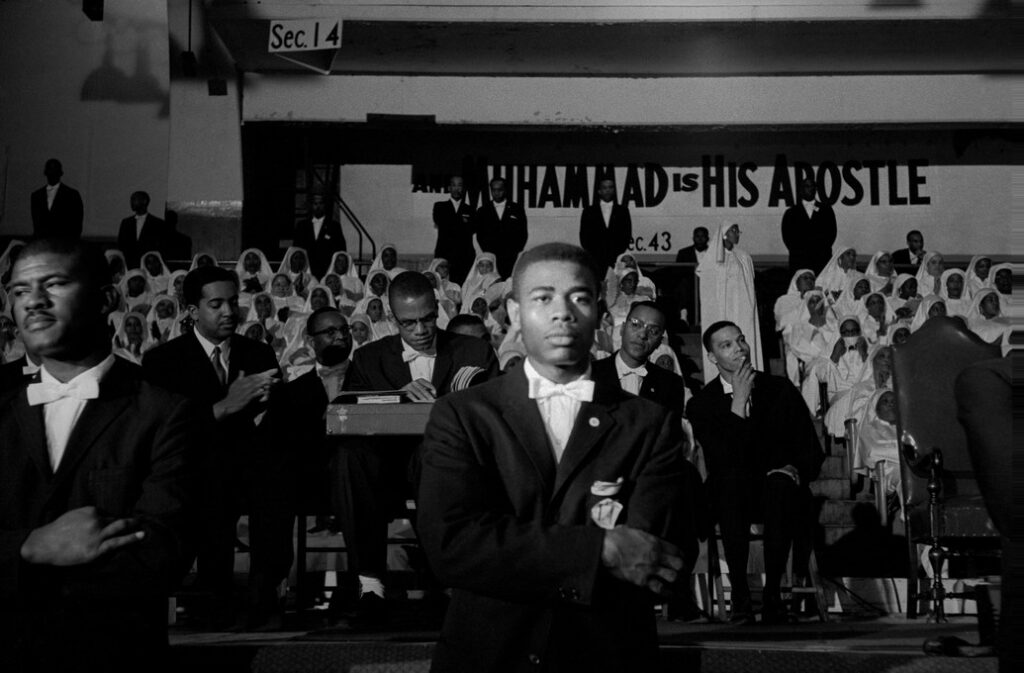Black Islam in the United States is not singular or static. While there are many varieties of Black Islam—some of which look like “orthodox” Sunni Islam, meanwhile others are more unconventional—this blog focuses on the Nation of Islam (NOI), with an emphasis on its group dynamics and politicization by both internal and external sources of authority. For many, Black Islam represents an active form of liberation in confronting America’s racial history and reclamation of black identity. Many African Americans were drawn to Black Islam as a movement and a community as it recovered the religion of African people prior to the forced conversion practices of colonization and slavery (Curtis 2005, 19). For black women, in particular, these organizations were “determined to undo the physical and psychological brutality of slavery, [attracting] women whose lives were still haunted by its violence on their bodies, their families, and their institutions” (Gibson and Karim 2014, 27).
In 1930, Wallace Fard Muhammad founded the NOI, eventually passing it on to Elijah Muhammad in 1934. Deeply influenced by black nationalist and Pan-Africanist movements, the NOI combines elements of Islamic schools of thought with Black nationalism. Through social justice and religious devotion, the NOI works to resist systems of oppression rooted in white supremacy and colonialism to achieve self-preservation and self-determination. The movement promoted controversial platforms, one of which was seen as starkly anti-white based on claims that the original people of the world were black, seeing the white man as the “devil.” Naturally, many white Americans—who, at the time, controlled society even more than today—saw the Nation as a threat to their hegemony and sought to suppress its influence by any means necessary.

In the mid-1940s, the NOI began to experience a decrease in membership, seeing intimidation and harassment of NOI members by the police as a driving force. Likewise, “Police records contained in [Fard and Muhammad’s] FBI files reveal that dozens of NOI members were routinely harassed and intimidated by local police departments solely because of their association with the NOI” (Gibson and Karim 2014, 9-10). Although the NOI did not engage in violent acts, its black nationalist rhetoric was thought to incite violence based on the externally imposed racialization of both blackness and Islam as violent.
Beyond the intimidation and harassment of the organization, individual actors were more highly politicized and stigmatized based on their intersectional identities, specifically Black Muslim women. Black Muslim women are politicized trilaterally for their racial, gendered, and religious minority status. In American society, the voices and experiences of these women do not exist without imposed politicization and marginalization as a product of the intersections of systems of oppression that perpetually commit violence against their bodies. For many, “being a Muslim woman in the United States is always a political and politicized process, in which women must continually create themselves as Muslims against the fraught intersections of race, gender, Islam, and the nation that circumscribe their lives” (Chan-Malik 2018,14). Systemic sources of authority politicize Black Muslim women’s bodies through the silencing of their voices from discourses on Black Islam and feminism and, more broadly, their erasure from the collective consciousness.
The racialization and politicization of Islam have a long history that traces back to imperial tensions, which “unfolded between the 1820s and 1880s alongside racialization of blackness” (Aydin 2017, 38). The forces of imperialism and white supremacy were influential in the simultaneous racialization processes of Muslim-ness and Blackness, yet other, ‘legitimate’ Muslims also informed this process of politicization. Aydin writes, “The Muslim modernist critique of decline was harsh and directed blame inward. It argued that Sufism and contemporary vernacular Muslim practices were the cause of the decline” (Aydin 2017, 72). The racialization and consequential politicization of Black Islam is nuanced and systemic, seeing that it was informed by both internal and external forces that labeled it as divergent from “real” Islam and the “mainstream” more broadly.
Today, in the wake of the War on Drugs and mass incarceration, the suspicion towards Black Muslims is located within the notion of ‘Prislam.’ In the past several decades, the rates of conversion to Islam in prisons has increased dramatically, with an estimated 1.8 million conversions by incarcerated black men in the last 60 years (Kusha in Ammar 2015, 24). While the motivations behind prison conversion to Islam are contested, many see ties between “the powerful social justice message of Islam as well the need to cope with a prison life that is oppressive, violent, and dehumanizing” (Kusha in Ammar 2015, 23). From the perspective of the federal government, however, these statistics aroused suspicion. Tied to Islam’s assumed synonymity with violence, terrorism, and radical fanaticism, the government saw prisons as ‘radicalization breeding grounds.’ The popularity of Islam within a prison setting–alongside fears of a black revolution and the destabilization of white hegemony–resulted in an urgency to control and suppress the NOI through stigmatization and antagonization.
The aim of white supremacy and the systems of oppression it authorizes is to collapse the diversity that exists within a group, in this case, Black Islam, to an essentialized, singular image. In politicizing and essentializing this complex and fluid ideology and identity, Black Islam became categorized as a militant, extremist threat to the status quo. As a result, Black Muslims in America are immensely misunderstood, which ultimately manifests in the policing and violence committed against their bodies and religious expression. Black Muslims as a whole experience double racialization as a result of representing two strongly politicized identities. While the political salience of particularly controversial identities or beliefs has changed over time, blackness and Muslim-ness have remained near the top of that list. The systemic politicization of Black Islam over the last several generations has culminated today in their violent subjugation, stripping them of sociopolitical agency and legibility, which does immense harm to the community.
